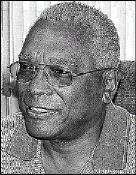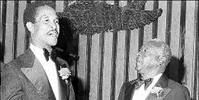George Headley's centenary
Published: Sunday | June 7, 2009

Neita
The celebration of George Headley's centenary on May 30, spearheaded by Lucas Cricket Club, is a bright light in a period darkened by the harsh realities of the economic and social problems that we continue to grapple with, both as a nation and in our individual lives.
The truth is that no matter how disappointed we may be when circumstances, external or internal, provide setbacks, sports means so much to the national psyche that any victory, be it in athletics, football, netball, dominoes or other, will always charge up the national feel-good batteries and restore a measure of hope and enthusiasm for tackling new projects.
hopes on cricket
Cricket is one such game on which Jamaicans and West Indians have continued to place their hopes and aspirations for world leadership at levels which would command respect and recognition for our citizens at home or across the respective diasporas.
Our present poor and humiliating performance in this arena is not only a let-down from the perspective of sports, but continues to punch a huge hole in our sense of national pride when we continue to bow to teams that once provided fodder for the West Indies.
The move by his mother club, Lucas CC, and other cricket stalwarts to focus attention on George Headley's grand contribution to Jamaica and the world is both timely and welcome.
Headley was a mere boy of 19 when he made a double century in 1928 (211) in his first international series against the English Lord Tennyson's X1 at Sabina Park.
The 'Chocolate Baby', as he was dubbed by the crowd, went on to make 176 in the first Test against England in Barbados in 1929, followed by two centuries of 114 and 112 in the third Test at British Guiana's Bourda grounds.
became known as 'atlas'
As he scored century after century against the best of the English, Australian and Indian Test-playing teams of that era, he became known as 'Atlas', because it was acknowledged that he carried the batting of the West Indies on his slim shoulders.
Headley had the admiration, support and hero worship of the large crowds that turned out wherever he played.
He was an icon in his time who was loved, not just for his brilliance on the field, but because by his dignity, quiet demeanour, sportsmanship, discipline and application, they saw him as representing their struggles to gain a foothold in society on the basis of performance and commitment to excellence, rather than privilege or colour.
It is important that our present bunch of players recognise and understand how and why George Headley's contribution goes beyond the glamour of instant television popularity or 20/20 fame.
It can be studied how the emergence of the West Indies as a Test-playing region in the late 1920s and 1930s coincided with the political and cultural movements that marked the early stirrings of independence across the British Caribbean.
For example, Headley's centuries in his first two international series resonated well with Marcus Garvey's call for dominion status (political independence) for Jamaica in 1929.
The political movement on the one hand, and the advancement in cricket on the other, continued to grow in the 1930s with the Progressive League, spearheaded by W.G. McFarlane, Norman Manley and Richard Hart proposing national self-government for Jamaica in 1937, and Alexander Bustamante giving a voice to the labour movement which swept Jamaica in 1938.
Fittingly, it was an epochal moment in cricket history that capped that eventful decade with Headley's unprecedented and immortal 106 and 107 at Lord's in the famous first Test vs England in 1939.
psychological lift
A victory for the West Indies team will never solve our economic or social problems. But if our teams could only recapture the vision and purposefulness of those earlier teams, we could be well on the way to finding that elusive psychological lift which separates losers from winners, boys from men, dependent from independent.
Congratulations to Lucas CC and the Headley Centenary Committee. The celebrations may just provide a reference for those who wish to discover what makes great sportsmen tick, that it's not just dexterity with bat and ball, but developing a character that can handle crowd adoration with maturity, rise to the occasion, love the game, and defend the hopes and aspirations of our individual nations.
Lance Neita is a communications and public relations specialist. Feedback may be sent to columns@gleanerjm.com, or lanceneita@hotmail.com.

BLACK HALL OF FAME: George Headley (right), Jamaica's greatest cricketer, greets Sir Garfield Sobers shortly before they and other West Indian sports heroes were inducted into America's Black Athletes Hall of Fame at an awards banquet at the New York Hilton hotel, Manhattan, on March 31, 1976. - file
